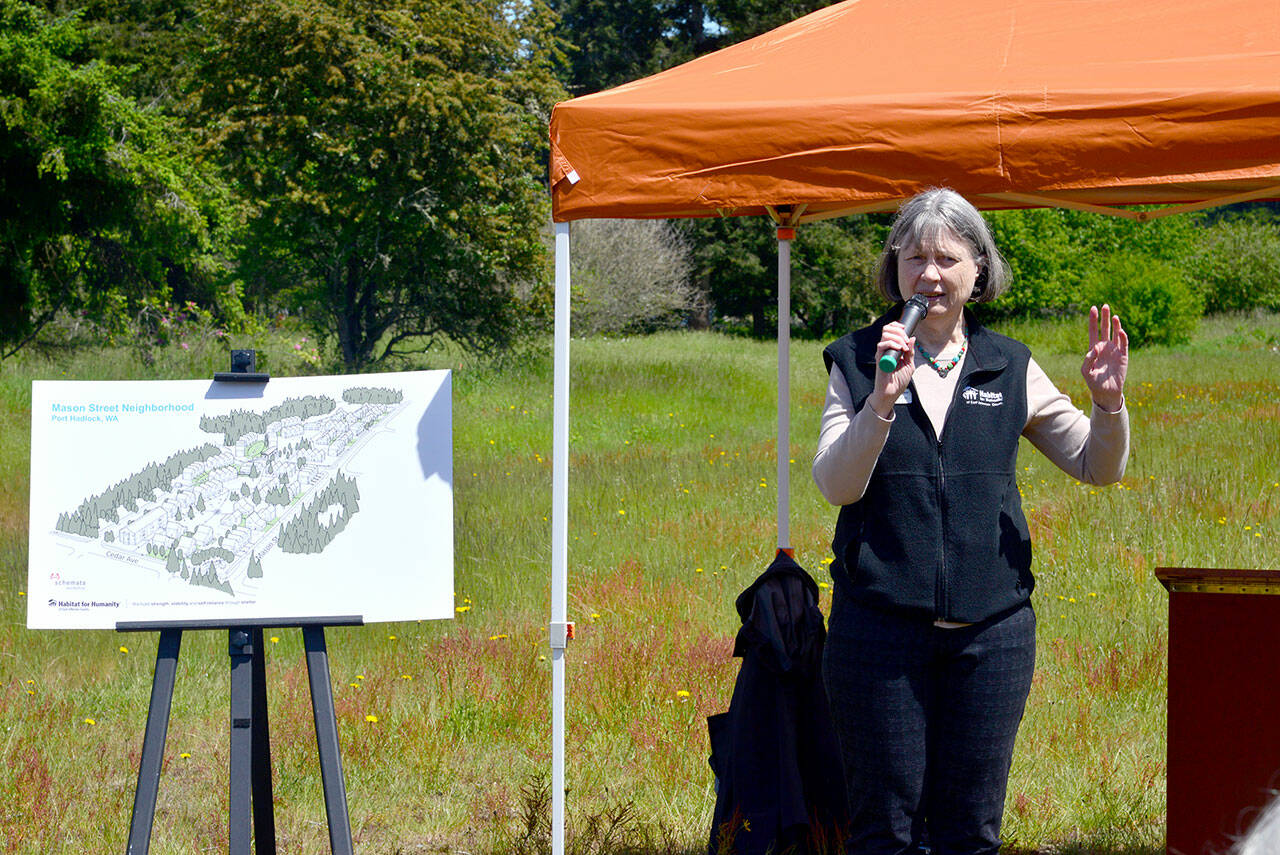PORT HADLOCK — Habitat for Humanity of East Jefferson County will start seeking permits for the next phase of its Mason Street housing development where the nonprofit hopes to build 150 homes in the next few years.
Standing in the open field that will one day be a new neighborhood of permanently affordable housing, Habitat EJC Executive Director Jamie Maciejewski said the homes at the Mason Street project will be open to people making a range of incomes.
“This neighborhood will be permanently affordable for a wide range of the workforce,” Maciejewski said. “People who work in retail to people who are in professional jobs, all industry jobs and in between.”
Maciejewski said Habitat EJC’s board recently approved moving the project into the pre-construction phase, which the organization hopes to have completed by next spring.
“We’ll be creating the design plans and documentation required for the county, state and possibly federal governments over the next 12 months,” said Bob Collins, Habitat’s director of construction, land and strategy. “We intend to start our horizontal development — moving dirt around — we’ve put a marker on the ground of Jan. 1, 2026, so we’ll see if we can make that happen.”
Purchase of the land — a former private airstrip next to the Jefferson County Library — and the master plan cost about $1.7 million, Maciejewski said, and the pre-construction phase will cost about $1.2 million. Building the infrastructure will cost about $9 million.
Of that roughly $12 million, Habitat has raised $4.4 million.
Of the remaining $7.5 million, Maciejewski said Habitat will seek funding from private and public sources and is waiting to hear from the office of U.S. Sen. Maria Cantwell, D-Seattle, on a $3 million grant for the project. In February, the Jefferson County Board of Commissioners sent a letter to Cantwell’s office supporting the project.
“That part is going to be completely underwritten by the community and the support of government at local, state and federal levels,” Maciejewski said of the neighborhood’s infrastructure. “Once that’s done, Habitat will not ever sell this land. Instead, we will lease this land to each owner with a 99-year permanent lease that controls how fast things can appreciate.”
Habitat EJC is taking a novel approach to the Mason Street project, looking to build homes for more than just Habitat for Humanity’s traditional clients.
Some of the homes at the site will be built and financed through Habitat’s traditional model, but some of the housing — including townhomes and apartments — will be open to anyone.
Habitat EJC is using an ownership model similar to what’s known as a land trust, where the ownership of the land is separated from ownership of the buildings on it. Habitat’s leases will be transferable and inheritable, and they will include provisions to limit appreciation. That means that someone can buy one of the homes at Mason Street and sell it later, but the amount they sell it for will be below market rate.
The same will be true of the apartment buildings planned at the site. Shares can be bought in ownership of the apartment building, and shareholders can then rent to tenants of their own choosing, but how much rent they can charge will be limited.
Habitat hopes local employers will be interested in buying shares in order to secure housing for their workers.
The hope is by separating ownership of the land and the homes on it, the Mason Street neighborhood will remain permanently affordable, Maciejewski said.
“That what we call subsidy, will stay here,” she said. “The houses that get built will be able to be bought and then sold for amounts that are affordable and shouldn’t need a lot of additional subsidy because it was the ground that was so expensive.”
Building the houses will require additional fundraising, she said, but not as much as financing for homes will be available.
“If we can have the land funded by private donations and government support and we only have to worry about the house, the mortgage will mostly cover the purchase,” Maciejewski said. “We’ll still need to do some fundraising, but not nearly as much.”
The project is possible thanks to the installation of a new sewer system currently under construction in the Port Hadlock area. Without the sewer system, state zoning laws would limit density in the area, preventing the construction of anything other than traditional single-family homes.
The sewer project costs about $37 million, $31 million of which was secured through state and federal funding, according to state Rep. Steve Tharinger, D-Port Townsend, who was at Thursday’s celebration.
Tharinger said the state Legislature is funding infrastructure projects statewide with the hopes of spring housing construction.
He also said Habitat EJC’s new ownership model allowed the state to provide more dollars.
“A few years ago, the state was a little reluctant to put money into Habitat plans because the state can’t gift public money,” Tharinger said. “But with the new model where Habitat or the ownership unit owns the underlying property, it makes that possible. We’ve really increased the number of dollars going into the homeowner-built programs like Habitat.”
________
Reporter Peter Segall can be reached by email at peter.segall@peninsuladailynews.com.

